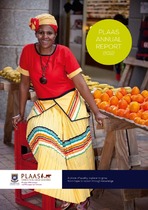| dc.contributor.author | PLAAS | |
| dc.date.accessioned | 2019-03-07T11:07:58Z | |
| dc.date.available | 2019-03-07T11:07:58Z | |
| dc.date.issued | 2013 | |
| dc.identifier.citation | PLAAS, 2013. Annual report 20012. Cape Town: Institute for Poverty Land and Agrarian Studies (PLAAS). | en_US |
| dc.identifier.uri | http://hdl.handle.net/10566/4403 | |
| dc.description.abstract | In much of the global South the instability in global financial
systems continued to have dire effects – and there were
many worrying signs that the serious food price inflation the
world experienced in 2008 would return. In sub-Saharan
Africa, policy-makers and investors continued to emphasise
that agriculture is central to inclusive economic growth in the
region. While this was accompanied by much optimistic talk
about the supposed benefits of a ‘green revolution’ in Africa,
it is unclear whether many of the projected investments will
materialise. In the absence of an understanding of the complex
political economy of inequality and hunger in the region, it is
unlikely that technical fixes alone will reduce poverty.
In South Africa, there was modest progress in the management
of poverty but no success in addressing the root causes of
massive structural unemployment and inequality. Land,
agrarian and rural development policy continued to languish
in the doldrums. There was little clarity about the status of
the Department of Rural Development and Land Reform’s
disappointing 2011 Green Paper; there were significant doubts
about the long-term implementability and scalability of the
Comprehensive Rural Development Plan, and controversial
proposals embodied in the Traditional Courts Bill caused
widespread concern. | en_US |
| dc.language.iso | en | en_US |
| dc.publisher | Institute for Poverty Land and Agrarian Studies (PLAAS) | en_US |
| dc.relation.ispartofseries | Annual report;2012 | |
| dc.subject | PLAAS | en_US |
| dc.subject | Annual report | en_US |
| dc.title | Annual report 2012 | en_US |
| dc.type | Book | en_US |

